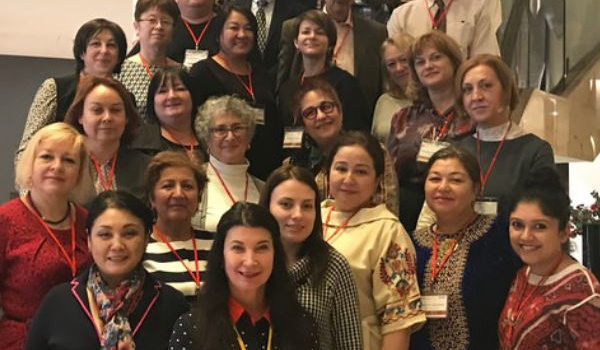
Chisinau, Moldova
15-16 November 2018
Organised by the Reproductive Health Training Centre, Moldova, with support from the Safe Abortion Action Fund
There were 65 participants. The meeting was in Russian with simultaneous translation in English. Participants included health professionals, health policymakers and NGO representatives from 11 counties in the region – Armenia, Azerbaijan, Belarus, Georgia, Kazakhstan, Kyrgyzstan, Tajikistan, Turkmenistan, Ukraine, Uzbekistan, and Russia.
Special guests came from the following groups and organisations: WHO Reproductive Health & Research Department, UNFPA EECA Regional Office, International Campaign for Womens Right to Safe Abortion, Society for Feminist Analyses, Centre for Reproductive Health Training, European Society of Contraception, FIGO Initiative on Preventing Unsafe Abortion, Sun Pharma/Terapia SA, Concept Foundation, Women Care Global, IPPF Europe Region, Gynuity Health Projects, UNFPA Moldova Country Office, WHO Moldova Country Office, Mother and Child Institute; from the following Moldovan government departments: Ministry of Health, Labor and Social Protection, Medicines and Medical Devices Agency; and from the following Moldovan hospitals: State University of Medicine and Pharmacy, National Public Health Agency, Municipal Clinical Hospital, National Centre for Reproductive Health and Medical Genetics, and Reproductive Health Centre.
The first day consisted of speakers and panel presentations, with discussion and comments from the floor. The topics were:
- The latest WHO recommendations and publications on safe abortion and family planning.
- Abortion and contraception in the Eastern European and Central Asian (EECA) region: current situation, trends and challenges.
- A panel discussion on using the WHO strategic assessment of abortion and contraception as a tool for implementing the WHO recommendations on abortion and post-abortion contraception and the impact of the assessments in Kyrgyzstan, Ukraine, Russia and Moldova.
- A model from France for providing medical abortion pills and prevention of unwanted pregnancy.
- Expanding access to medical abortion up to 70 days, use in the 11th week and the second trimester, and the role of telemedicine.
- Medical abortion use in the EECA region – access, rate, acceptability, and problems.
- A panel discussion on what is missing in four countries – Azerbaijan, Uzbekistan, Tajikistan and Belarus – as regards access to medical abortion pills.
- Improving prevention of unwanted pregnancy.
In the afternoon, representatives of FIGO, UNFPA, WHO, Concept Foundation, DKT/Women Care Global, and Sun Pharma/Terapia SA discussed access to quality reproductive health supplies in the region, looking at distribution of Medabon and manual vacuum aspiration equipment in Moldova, Kyrgyzstan and Kazakhstan. The day closed with a presentation on the anti-choice movement in the EECA region and a panel discussion of the threats to sexual and reproductive rights in the region, with examples from Turkmenistan, Georgia, Russia and Ukraine.
The second morning included three speakers on national guidelines/protocols on abortion and prevention of unwanted pregnancy, tools for implementing them and improving quality of care. They were followed by four speakers from Western Europe and international NGOs on the importance of networking and campaigning for advancing women’s right to contraception and safe abortion.
Galina Maistruk from Ukraine proposed the launching of a renewed regional pro-choice coalition, and described the history of the former regional network, the Eastern European Association for Reproductive Choice, which she coordinated from Ukraine and which was active up to 2011 when lack of funding and the political situation made it impossible to continue. She proposed that RHTC in Moldova should coordinate the new network, which was agreed, and there was a discussion of needs and possible activities.
The meeting then broke up into national groups to develop national action plans with a focus on development/adaptation/implementation of national guidelines and protocols, which were then presented to the meeting.
The Powerpoint texts of all presentations (some in Russian) and photos can be found at:
http://www.site.cidsr.md/en/conferinta/presentations-of-the-regional-conference-15-16-11-2018/



